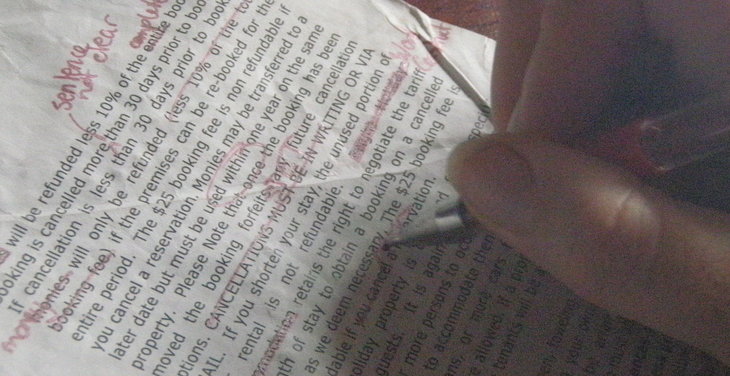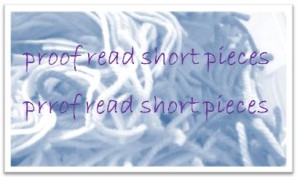I hope you find my writing and business tips and observations useful. My business and blog are dedicated to helping businesses communicate clearly and reach their potential.
Read, subscribe to my newsletter, enjoy!Tash
Facebook ads – short but important
Proof reading is important – even for short and (relatively) simple things like a Facebook ad.
A Facebook ad that needs proof reading
Unfortunately my screenshot didn’t work (and the ad hasn’t shown again since!) but I saw an ad this morning that seriously needed some help…
The heading of the ad was “New year. New hom.”
For a major company involved in real estate sales, you’d think home is an important word to get right.
I’d also have expected a company of that size to have a process of checking and approving ads before they go live – a one-person business is often at bigger risk of such errors because it is harder to correct your own writing.
The body of the ad included “but hurry – offer ends 28 February!”
Perhaps they meant hurry into your time machine?
That isn’t necessarily a proof reading error (unless they actually got the date wrong!) as it may be an incorrect setting on when the ad is to be run. Either way, attention to detail can have a big impact!
Proof reading matters…
We all do it – we write something and assume it is written exactly as we meant it to be.
But between typing mistakes (typos), thinking faster than we can type and actual spelling/grammatical errors, it is easy to have text that is not exactly what we wanted.
So we need to check our writing for errors. ALL our writing, whether short or long, whether technical, legally required or marketing, whether online or offline. It’s that simple!
And the key proof reading rules are to get someone else to check it and leave some time between the writing and proof reading.
Oh, and don’t rely on spell check to find all your errors, either. For example, in this post I typed ‘won’ instead of ‘own’ and a spell check would have accepted that as fine.[Tweet “Leave time between writing and proof reading, and don’t rely on spell check…”]

![]()

Proof read your work…
You have heard it before, but I’ll say it again – it is critical to proof read your work before sending it out to work for you. Even if it is boring and you are short on time, proof reading is important and a valuable use of your time.
I just came across a perfect example of someone not proof reading after using a spell checker (at least I am assuming they used a spell checker!) Too often people let a spell checker do the proof reading for them but it just isn’t a safe option.
I hate to use the word “disguised”, simply because you’re NOT hiding anything from your prospects, nor are you tricking them. But the bottom line is – “disgusted” *best describes* what your “free information pack” really is. It’s disgusted from THE FACT that it’s an ad, or that it WILL BE selling them something.
{That is an exact copy – capitals, punctuation and spelling are not mine!}
Easy enough to make a mistake while typing disguised and having a spell check suggest disgusted as the closest word.  Very easy to ignore that and give a silly message, too, unless you proof read properly after using the spell check.
Very easy to ignore that and give a silly message, too, unless you proof read properly after using the spell check.
Of course, some of us may be amused at a marketing eBook referring to marketing techniques like information packs as disgusting, but I doubt that was their intent!
Proof reading is more than checking everything is spelt correctly – you also need to check the correct word is being used. And having a habit of proof reading everything you write, even the shortest emails and blog comments, will make it easier to project a professional and caring image for yourself and your business.
Having said that, what is your favourite story about a failure to proof read?
Proofreading tips
 Ok, proofreading is boring – not many people actually enjoy the thought of reading their work over and over again to find errors. It’s a bit better proofreading someone else’s work, but most people still don’t want to do it.
Ok, proofreading is boring – not many people actually enjoy the thought of reading their work over and over again to find errors. It’s a bit better proofreading someone else’s work, but most people still don’t want to do it.
However, like many things in business and in life, it is necessary.
Necessary that is if you want a professional finish to your written materials.
So here are my tips to make it as easy and painless as possible:
- hire a proofreader! Ok, I added this point for fun as a plug (yes i can proof read and edit for you!) although it is a valid option
- get someone else to read it for you – fresh eyes are more likely to spot errors and other issues
- use a spell check to find the obvious typos (e.g. teh and yuo) BUT do not rely on it alone as it will not pick up the wrong word (e.g. know and now are both real words) and may not use your local or preferred spelling (e.g. color vs colour)
- leave as much time as possible between writing/editing and proofreading (or subsequent rounds of proofreading) – a few days is ideal but overnight is a minimum. If time really is short, do something else in between so your mind has ‘forgotten’ some of the details
- read it out loud – your tongue often trips over things your eyes would accept
- read it backwards – that way you will read the actual words instead of the sentences so spelling errors are more obvious
- print it rather than read it on a screen – not only is this easier on your eyes, it gives a different visual perspective and you can even read it away from your desk. I find curled up on a couch is great for editing printed documents…
- change magnification of the text – seeing it bigger sometimes makes words stand out more
Some tips will suit you more than others, some will be more appropriate for particular documents, too. However, using a range of techniques (especially for more important documents) will help you achieve a higher quality document.


Recent Comments